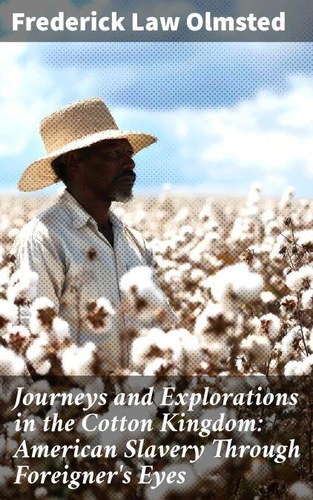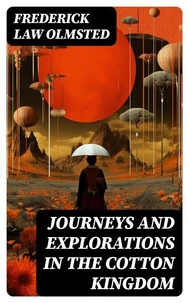Journeys and Explorations in the Cotton Kingdom: American Slavery Through Foreigner's Eyes. Witnessing Slavery: A Foreigner's Account
Par :Formats :
Disponible dans votre compte client Decitre ou Furet du Nord dès validation de votre commande. Le format ePub est :
- Compatible avec une lecture sur My Vivlio (smartphone, tablette, ordinateur)
- Compatible avec une lecture sur liseuses Vivlio
- Pour les liseuses autres que Vivlio, vous devez utiliser le logiciel Adobe Digital Edition. Non compatible avec la lecture sur les liseuses Kindle, Remarkable et Sony
 , qui est-ce ?
, qui est-ce ?Notre partenaire de plateforme de lecture numérique où vous retrouverez l'ensemble de vos ebooks gratuitement
Pour en savoir plus sur nos ebooks, consultez notre aide en ligne ici
- Nombre de pages273
- FormatePub
- ISBN859-65--4768409-1
- EAN8596547684091
- Date de parution01/12/2023
- Protection num.Digital Watermarking
- Taille970 Ko
- Infos supplémentairesepub
- ÉditeurGOOD PRESS
Résumé
In "Journeys and Explorations in the Cotton Kingdom: American Slavery Through Foreigner's Eyes, " Frederick Law Olmsted presents a compelling account of the South in the mid-19th century, offering an astute observation of the social and economic fabric shaped by slavery. Richly detailed and rigorously researched, Olmsted'Äôs narrative combines travel writing with personal reflection, revealing not only the landscape of the cotton plantations but also the systemic injustices endured by enslaved individuals.
His firsthand experiences and vivid descriptions serve to illuminate the stark contrasts in culture and lifestyle, positioning his work within the broader context of antebellum America, making it a crucial literary contribution to understand the moral complexities surrounding slavery. Olmsted, a prominent landscape architect and social critic, had begun his career fascinated by the natural environment, yet his travels through the South deepened his engagement with issues of ethics and humanity.
His earlier experiences in journalism and his commitment to social reform influenced his perspective, prompting him to confront the harsh realities of American slavery as a foreign observer. Olmsted'Äôs background and ethos reflect a growing concern among contemporaries regarding the moral implications of economic prosperity built on exploitation. This book is highly recommended for scholars, students, and general readers interested in American history, social justice, and the environmental implications of 19th-century agriculture.
Olmsted'Äôs insightful commentary not only serves as a significant historical document but also encourages critical reflection on contemporary social issues, making it essential reading for those seeking to understand the legacies of slavery in America.
His firsthand experiences and vivid descriptions serve to illuminate the stark contrasts in culture and lifestyle, positioning his work within the broader context of antebellum America, making it a crucial literary contribution to understand the moral complexities surrounding slavery. Olmsted, a prominent landscape architect and social critic, had begun his career fascinated by the natural environment, yet his travels through the South deepened his engagement with issues of ethics and humanity.
His earlier experiences in journalism and his commitment to social reform influenced his perspective, prompting him to confront the harsh realities of American slavery as a foreign observer. Olmsted'Äôs background and ethos reflect a growing concern among contemporaries regarding the moral implications of economic prosperity built on exploitation. This book is highly recommended for scholars, students, and general readers interested in American history, social justice, and the environmental implications of 19th-century agriculture.
Olmsted'Äôs insightful commentary not only serves as a significant historical document but also encourages critical reflection on contemporary social issues, making it essential reading for those seeking to understand the legacies of slavery in America.
In "Journeys and Explorations in the Cotton Kingdom: American Slavery Through Foreigner's Eyes, " Frederick Law Olmsted presents a compelling account of the South in the mid-19th century, offering an astute observation of the social and economic fabric shaped by slavery. Richly detailed and rigorously researched, Olmsted'Äôs narrative combines travel writing with personal reflection, revealing not only the landscape of the cotton plantations but also the systemic injustices endured by enslaved individuals.
His firsthand experiences and vivid descriptions serve to illuminate the stark contrasts in culture and lifestyle, positioning his work within the broader context of antebellum America, making it a crucial literary contribution to understand the moral complexities surrounding slavery. Olmsted, a prominent landscape architect and social critic, had begun his career fascinated by the natural environment, yet his travels through the South deepened his engagement with issues of ethics and humanity.
His earlier experiences in journalism and his commitment to social reform influenced his perspective, prompting him to confront the harsh realities of American slavery as a foreign observer. Olmsted'Äôs background and ethos reflect a growing concern among contemporaries regarding the moral implications of economic prosperity built on exploitation. This book is highly recommended for scholars, students, and general readers interested in American history, social justice, and the environmental implications of 19th-century agriculture.
Olmsted'Äôs insightful commentary not only serves as a significant historical document but also encourages critical reflection on contemporary social issues, making it essential reading for those seeking to understand the legacies of slavery in America.
His firsthand experiences and vivid descriptions serve to illuminate the stark contrasts in culture and lifestyle, positioning his work within the broader context of antebellum America, making it a crucial literary contribution to understand the moral complexities surrounding slavery. Olmsted, a prominent landscape architect and social critic, had begun his career fascinated by the natural environment, yet his travels through the South deepened his engagement with issues of ethics and humanity.
His earlier experiences in journalism and his commitment to social reform influenced his perspective, prompting him to confront the harsh realities of American slavery as a foreign observer. Olmsted'Äôs background and ethos reflect a growing concern among contemporaries regarding the moral implications of economic prosperity built on exploitation. This book is highly recommended for scholars, students, and general readers interested in American history, social justice, and the environmental implications of 19th-century agriculture.
Olmsted'Äôs insightful commentary not only serves as a significant historical document but also encourages critical reflection on contemporary social issues, making it essential reading for those seeking to understand the legacies of slavery in America.






